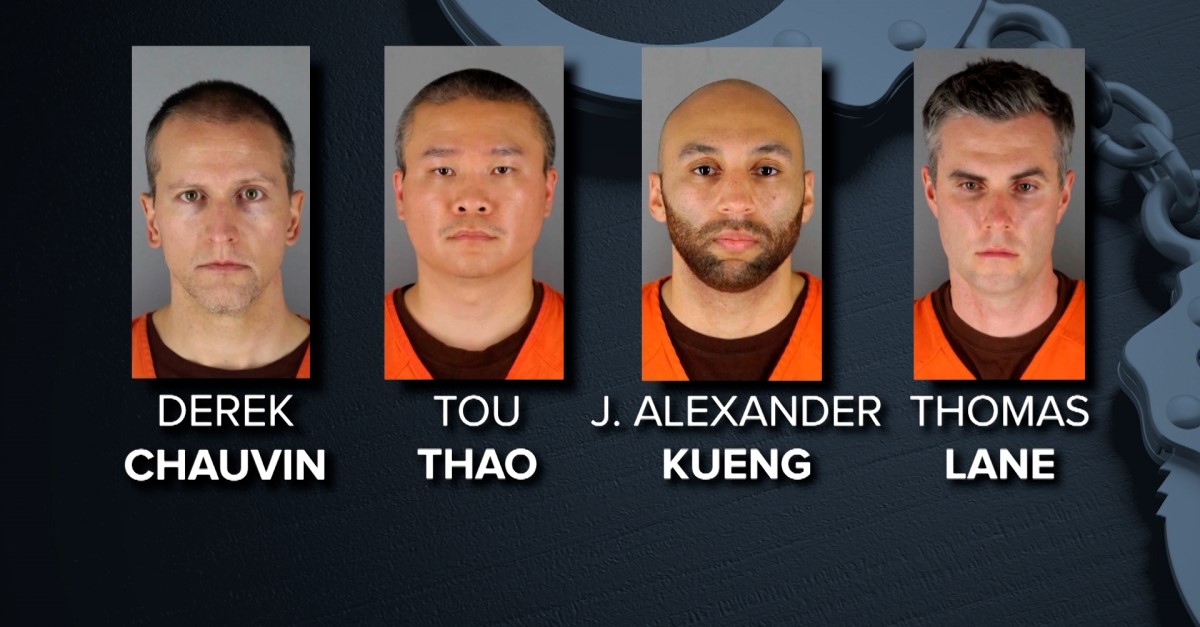
Minneapolis cops charged with killing George Floyd.
In the latest salvo by Attorney General Merrick Garland’s emboldened U.S. Department of Justice Civil Rights Division, ex-Minneapolis Police Officer and convicted murderer Derek Chauvin and the three other officers with him on the day George Floyd, Jr. died in custody have been hit with federal civil rights charges.
Chauvin is also charged separately with another alleged civil rights abuse involving a juvenile in 2017.
Unsealed on Friday, the first indictment states that Chauvin “willfully deprived George Floyd of the right, secured and protected by the Constitution and laws of the United States, to be free from an unreasonable seizure, which includes the right to be free from the use of unreasonable force by a police officer.”
“Specifically, Defendant Chauvin held his left knee across George Floyd’s neck, and his right knee on Floyd’s back and arm, as George Floyd lay on the ground, handcuffed and unresisting, and kept his knees on Floyd’s neck and body even after Floyd became unresponsive,” the grand jury charged.
Chauvin was charged separately in another indictment for allegedly holding an unnamed juvenile “by the throat” and hitting that minor “multiple times in the head with a flashlight.” A second count claims that Chauvin “held his knee on the neck and the upper back” of the 14-year-old, who allegedly “was lying prone, handcuffed, and unresisting.”
Both indictments were dated Thursday and were made public early Friday morning.
Federal prosecutors slammed Chauvin’s colleagues, Officers Tou Thao and J. Alexander Kueng, for failing to intervene.
“Specifically, Defendants Kueng and Thao were aware that Defendant Chauvin was holding his knee across George Floyd’s neck as Floyd lay handcuffed and unresisting, and that Defendant Chauvin continued to hold Floyd to the ground even after Floyd became unresponsive, and the defendants willfully failed to intervene to stop Defendant Chauvin’s use of unreasonable force,” the indictment continues.
The final officer, Thomas Lane, is charged with “deliberate indifference” to Floyd’s medical needs. So are Chauvin, Thao and Kueng.
Chauvin’s three colleagues appeared in federal court this morning in Minnesota on Friday morning, where Thao was released on a $25,000 bond. All three continue to face state charges related to Floyd’s murder.
Minnesota Attorney General Keith Ellison welcomed the news of the additional federal cases.
“Federal prosecution for the violation of George Floyd’s civil rights is entirely appropriate, particularly now that Derek Chauvin has been convicted of murder under Minnesota law for the death of George Floyd,” he wrote in a statement. “The State is planning to present our case against the other three defendants to another jury in Hennepin County later this summer.”
In the immediate wake of Chauvin’s state court murder convictions, Garland remarked that the federal criminal probe against Chauvin had been ongoing as of the day of the state court verdict. The attorney general announced a pattern-or-practice investigation of the Minneapolis Police Department the following day, examining whether the department has “potentially systemic” issues involving uses of force involving people with behavioral health disabilities and protesters.
The Justice Department revealed on Friday it is far from done with its reaction to Floyd’s death.
On April 28, the same day the department indicted Ahmaud Arbery’s accused murderers for federal hate-crime charges, the Minneapolis Star-Tribune reported that federal prosecutors would imminently ask a grand jury to consider civil rights charges against Chauvin, Thao, Kueng, and Lane. The indictments were filed May 6.
Citing sources familiar with the discussions, the Star-Tribune reported that the investigation was originally considered to be a “contingency plan” to the state prosecution in the event of Chauvin’s full acquittal or a mistrial, upon which the officer would be arrested outside the courthouse.
“The backup plan would not be necessary,” the Star-Tribune noted when Chauvin was, indeed, convicted on state charges.
One of the sources told the paper that prosecutors would move the criminal case ahead to a grand jury for all four, despite Chauvin’s convictions.
Read the indictments below: